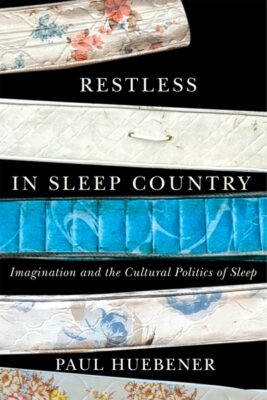In Restless in Sleep Country, Paul Huebener proposes a critical analysis of sleep as a human activity and as a symbol in Canadian culture. As in his previous work on time, Nature’s Broken Clocks, Huebener supports his analysis by making use of a broad range of cultural objects – from poetry, literature, and cinema to advertisements and cellphone apps.

Restless in Sleep Country
Imagination and the Cultural Politics of Sleep
Paul Huebener
McGill-Queen’s University Press
$39.95
paper
256pp
9780228020387
Indeed, the strongest aspect of Huebener’s approach to the study of (sleep) culture is his versatility. In inviting us to unpack the narratives underlying advertisements, he gives us tools both to live and to think critically about the reality we may otherwise take for granted. For example, he draws together a COVID-era car ad and another for a mattress company to undermine the supposedly “sleep-positive” views they propose, convincingly demonstrating that while sleep may seem to be a valued commodity in Canada, it is almost exclusively deemed so only when placed in relation to an increase in productivity. His critique of productivity worship under capitalism does not end there. Huebener’s text is rife with examples of sleep at the margins: the criminalization of sleep experienced by the unhoused, the sleeplessness imposed on those experiencing poverty, systemic racism, and/or other forms of oppression.
The sleep narratives Huebener centres throughout the book are incredibly diverse, both in terms of authorship and medium. He walks the reader through his choice of literary works to read critically, analyzing in parallel poetry and prose by Métis author Cherie Dimaline, Sri Lankan Canadian writer Michael Ondaatje, and white Albertan veteran Benjamin Hertwig. In addition to the work of these award-winning authors, he also turns his attention to the “Sleep Stories” on the Calm app and to Awake, a Netflix apocalyptic thriller that was “lambasted by critics.”
While Restless in Sleep Country offers thorough close readings of such varied objects, Huebener sometimes casts too wide a net. The last chapter, on the links between climate change and sleep(lessness), includes as examples several works of speculative fiction, Rita Wong’s poetry, Marlene Creates’ visual art, and Simon Orpana’s illustrations, to name a few. As a result, his analysis is not nearly as detailed as in the previous chapters, and the image of “Sleeping in the Anthropocene” he paints isn’t as persuasive. Though Huebener is right about the possible effects of climate disasters on sleep – as exemplified by his own experience of heatwaves and flooding in Alberta – the connections he draws are far more tenuous. Does climate change impact sleep directly, or does it simply exacerbate the demands made on sleep in Canadian society outlined in previous chapters?
Huebener’s book is an engrossing read, and the diversity of sources on which he draws ensures that readers will find one that speaks to them. In this way, Huebener shows us that cultural narratives about sleep are everywhere, and that we all have the power to shift them if we just learn to read critically.mRb






0 Comments